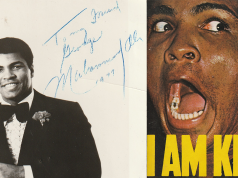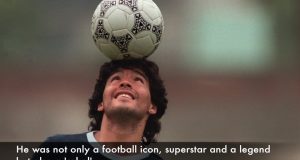 By
By
George Das: He looked so pathetic. Frail and small. No more the stocky, muscular footballer I first interviewed way back in 1972.
It was Saturday 13th May 1989. Fauzi Omar and I had lost our direction before arriving at Mokhtar Dahari’s home in Taman Keramat, Kuala Lumpur around 4pm. We were greeted by his wife Tengku Zarina Ibrahim at the door of his modest house. She said: “Thank you for coming. We’ve been getting non-stop phone calls and visitors due to your story today Fauzi.” We mumbled our apologies and as we entered the doorway we saw Mokhtar slouched on a lounge chair, unable to get up. So we went over and shook his hand and exchanged greetings. I held on to his right hand for a while longer. He did not squeeze in his usual fashion, but he left it limp in both my hands.
Both of us looked at Mokhtar with disbelief. He didn’t look at all like the menacing striker we once knew. A threatening force in attack for Malaysia and Selangor, he used to tear the opposing defences apart with his accelerating burst of speed and powerful, stunning shots at goal.

There was that goal that earned Malaysia a draw (1-1) against England B at Merdeka Stadium in 1987. After manoeuvring past several players from midfield into the England half, Mokhtar’s powerful blast had keeper Joe Corrigan completely beaten and the 45,000 fans screaming in ecstasy.
As these visions of Mokhtar’s prowess played on my mind, we were suddenly jolted by a voice struggling to speak. I felt sadness creep inside me. His vocal chords were straining and the words came out in a sluggish manner. In fact he was near intelligible.
This was so unlike Mokhtar of before. He used to have a very strong gruff voice. All that had disappeared due to his suffering from motor neurone disease (MND).
We did not discuss or talk about his ailment as there were other guests around. We were all fighting with our own thoughts on why this had to befall him!
Trying to reason why this was happening to one of Malaysia’s, no Asia’s, most decorated striker of the 70s was beyond us.

Tengku Zarina kept telling us that he had seen a number of specialists but each one of them had his own opinion and none had a cure or a solution.
Every now and then, the telephone kept ringing. The callers were friends wanting to either come over or wishing Mokhtar a speedy recovery.
As we departed an hour later we did not know that this would be the last time that we would be speaking to Mokhtar. We were enveloped with a great sense of sadness. For a long while, we were both very quiet as our troubled thoughts kept drifting into the past. I remember he once said: “I allowed myself to believe that I was indeed Supermokh, the goal-getter supreme. Give me half a chance and I would crack in a goal,” he said this when he quit the game after the 1978 Asian Games due to physical and emotional exhaustion. He returned to the game when he featured in the 1980 Merdeka Tournament.
After what looked like a long silence, we were jolted back to reality. We both agreed he was very frank with his opinions, before or after a match. He was very approachable and never shied away from being interviewed.
As we drove by the Merdeka Stadium, we could still vividly picture him as a one-man goal-scoring machine for Selangor and a pivot to the national team’s quest for goals. He was a scoring machine with speed and power.
By
George Das



 If you have an interesting personal story of a sports personality with photographs and video, we would like to publish it on this site.
If you have an interesting personal story of a sports personality with photographs and video, we would like to publish it on this site.


